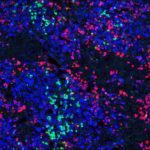Link to Pubmed [PMID] – 18684967
J. Immunol. 2008 Aug;181(4):2764-71
In case of hepatic damage, the liver uses a unique regeneration mechanism through proliferation of hepatocytes. If this process is inhibited, bipotent oval stem cells proliferate and differentiate to hepatocytes and bile ducts, thus restoring liver mass. Although oval cell accumulation in the liver is often associated with inflammatory processes, the role of lymphocytes in oval cell-mediated hepatic regeneration is poorly understood. We treated wild-type and immunodeficient mice with an oval cell-inducing diet: in the absence of T cells (CD3epsilon(-/-) and Rag2(-/-)) there were fewer oval cells, whereas in alymphoid mice (Rag2(-/-)gamma(c)(-/-)) a strongly reduced oval cell response and higher mortality, due to liver failure, was observed. Adoptive transfer of T cells into alymphoid mice protected them from liver failure, but was insufficient to restore the oval cell response. Treatment of Rag2(-/-) mice with an NK cell-depleting Ab resulted in a significantly diminished oval cell response. These genetic experiments point to a major role for NK and T cells in oval cell expansion. In wild-type mice, oval cell proliferation is accompanied by an intrahepatic inflammatory response, characterized by the recruitment of Kupffer, NK, NKT, and T cells. Under these conditions, lymphocytes produce T(H)1 proinflammatory cytokines (IFN-gamma and TNF-alpha) that are mitogenic for oval cells. Our data suggest that T and NK lymphocytes stimulate oval cell expansion by local cytokine secretion. This beneficial cross-talk between the immune system and liver stem cells operates under noninfectious conditions and could promote tissue regeneration following acute liver damage.

